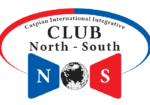The Caspian International Integrative North-South Club

The Caspian International Integrative North-South Club
The Caspian International Integrative North-South Club
It is a club known as a bridge of international communication and coordination. In this club, representatives of countries, businesses, and scientists from Caspian Sea coastal countries and other Eurasian countries, along with stakeholders, collaborate in integration and development through completing logistics and interaction based on the Caspian Sea region and further along the North-South transportation corridor. The main objectives of these collaborations are as follows:
1. Logistics analysis and examination of geostrategic processes in Eurasia to strengthen the role of governments and businesses located in the extensive North-South international transportation corridor.
2. Improvement of goods and services exchange and creating favorable conditions for people’s mobility across the vast Eurasian region.
3. Enhancing the efficiency of integrated development processes through logistics.
4. Strengthening economic and ecological security.
5. Identifying the role of the Caspian Sea region as the nucleus of major logistic routes in the development of a green economy.
6. Coordination and efforts to provide specific proposals for government organizations and businesses of stakeholder countries in economic and logistics development through interaction with commissions and intergovernmental structures, including chambers of commerce.
7. Strategic support for investment projects, innovation, and other projects that contribute to the development and integration of the economy and logistics, utilizing the capacity of interaction and integrated development among countries, peoples, and cultures in the region.
The Caspian Integrative North-South Club, in order to achieve its mission, carries out its activities in collaboration with and with the membership of the following representatives:
1. Representatives of governmental structures:
Representatives from member countries including Russia, Iran, India, Azerbaijan, Kazakhstan, Turkmenistan, and other countries involved in international North-South transportation corridors and other logistics routes in Eurasia are present as representatives of governmental structures in this club. They play an important role in formulating and implementing logistics policies and development programs for the prospective region and contribute significantly to the logistics and economic development of the region.
2. Representatives of companies and organizations:
Representatives from companies, economic activity units, state cooperatives, clubs, and other organizations in the field of logistics, trade relations, and international cooperation are also members of the club. They promote international trade, cooperation, and development by collaborating in the formulation of strategies and the implementation of logistics plans and projects.
3. Influential individuals:
Influential individuals in the public sphere, representatives of science and culture, ecological and political organizations are also members of the club. They contribute to the realization of the club’s goals by promoting positive ideas and concepts, supporting environmental preservation, fostering understanding and interaction among cultures, and raising public awareness.
In general, the International Caspian North-South Convergence Club, in collaboration with and membership of various representatives from governmental structures, businesses, scientific and social organizations, undertakes actions to enhance coordination and effectiveness of the economies of member countries and develop logistics in the Eurasian region and the North-South international transportation corridor.
The activities of the International Caspian North-South Convergence Club are of great importance for problem-solving and regional development. The main impacts of the club’s activities for problem-solving are mentioned below:
1. Creating economic integration:
The Caspian International Integrative North-South Club strives to achieve economic integration by developing logistics and establishing international transportation connections between the North and South. Through integration and collaboration between the coastal countries of the Caspian Sea and other countries in the vast Eurasian region, it aims to achieve economic coherence and enhance economic coordination and efficiency in the region, leading to the economic development and growth of member countries.
2. Establishing coordinated transportation policies:
As a development entity for the North-South international transportation corridor, the club aims to establish coordinated transportation and customs policies among the Persian Gulf coastal states and other countries in the wider Eurasian region. This effort removes barriers in transportation, facilitates the flow of goods and capital between countries, and enables optimal utilization of logistics capacities.
3. Leveraging the competitive advantages of the region:
The Caspian convergence club seeks to promote economic improvement and development in the region by utilizing the competitive advantages of the North-South international transportation corridor, including Iran, Turkmenistan, Russia, and other countries along the Eurasian region.
4. Increasing cargo flow and optimizing transportation:
The club promotes cooperation in containerization of goods and increasing their flow in the North-South international transportation corridor. Additionally, developing optimal tariffs, coordinating transportation laws, and managing administrative barriers are among the club’s responsibilities to improve transportation and reduce logistics costs.
5. Implementing spatial economics ideas and technologies:
The club endeavors to improve economic and business structures, as well as contribute to the sustainable development of the region, through the development of spatial economics ideas and technologies, along with the integration and expansion of the vast Eurasian region and the North-South international transportation corridor.
6- Collaboration with International Organizations:
The Caspian International Integrative North-South Club cooperates with various international unions in the framework of project implementation. This collaboration includes the Eurasian Economic Union, the Shanghai Cooperation Organization, and the Ministry of Foreign Affairs of the Russian Federation, which collaborate with countries in the vast Eurasian region and the North-South International Transport Corridor. These interactions contribute to strengthening international cooperation and facilitating the implementation of joint projects.
Considering these effects, the activities of the Caspian International Integrative North-South Club can contribute to the improvement and economic development, logistical facilitation, establishment of international interactions, and the growth of the Eurasian region.
The Caspian International Integrative North-South Club can help address the following issues:
1- Environmental Advantage Determination and Economic Development Integration:
The club can play a significant role in determining environmental advantages and creating integration in the economic development of the vast Eurasian region and the North-South International Transport Corridor. This assistance includes providing joint solutions for environmental protection, pollution reduction, and greater resource efficiency.
2- Strengthening the Role of the North-South International Transport Corridor:
The club can facilitate the intensification and strengthening of the North-South International Transport Corridor’s role in global logistics, promoting freight transportation, and creating new trade flows. This includes the use of innovative logistics technologies, improving transport facilities, and enhancing the attractiveness of cargo development in the region.
3- Cargo Development in Eurasia and Transit of Regional Countries:
The club can contribute to the development of cargo transportation in the Eurasian region by collaborating with the Russian Federation and enhancing the transit potential of Caspian and Eurasian regional countries. This includes the development of transportation infrastructure, improvement of customs relations, and facilitation of regional trade.
4- Economic Development and Business Expansion:
The club can aid in the economic development of countries and business structures in the Caspian and the wide Eurasian region by developing logistical routes in the Caspian Sea and beyond. This includes creating investment opportunities, facilitating trade, and improving access to markets.
5- Creating a Digital Ecosystem:
The club can play an active role in creating and developing a digital ecosystem in the wide Eurasian region and the North-South International Transport Corridor. This includes the development of digital technologies, upgrading technical infrastructure, and establishing electronic communications.
6- Attracting Investments:
The club can help attract investments in the development of the North-South Corridor and other logistics routes in the Caspian region. This includes presenting suitable proposals and plans for the establishment of industrial and economic zones, attracting representatives from neighboring countries, and creating investment platforms.
7- Support for Cultural and Touristic Projects:
The club can address factors that hinder the growth and progress of cultural, touristic, and scientific projects in the Caspian Sea and the wide Eurasian region. This includes supporting the development of cultural and tourism projects, increasing cooperation between countries, and creating common platforms.
8- Development of Logistics Culture:
The club can assist in developing a logistics culture in the coastal countries of the Caspian Sea that are less developed and require increased transportation capabilities. This includes providing training, improving transport infrastructure, and upgrading relevant technologies.
The Caspian International Integrative North-South Club, in collaboration with member countries and relevant institutions, can play a crucial role in addressing these issues and contribute to the development and strengthening of regional and international cooperation.


